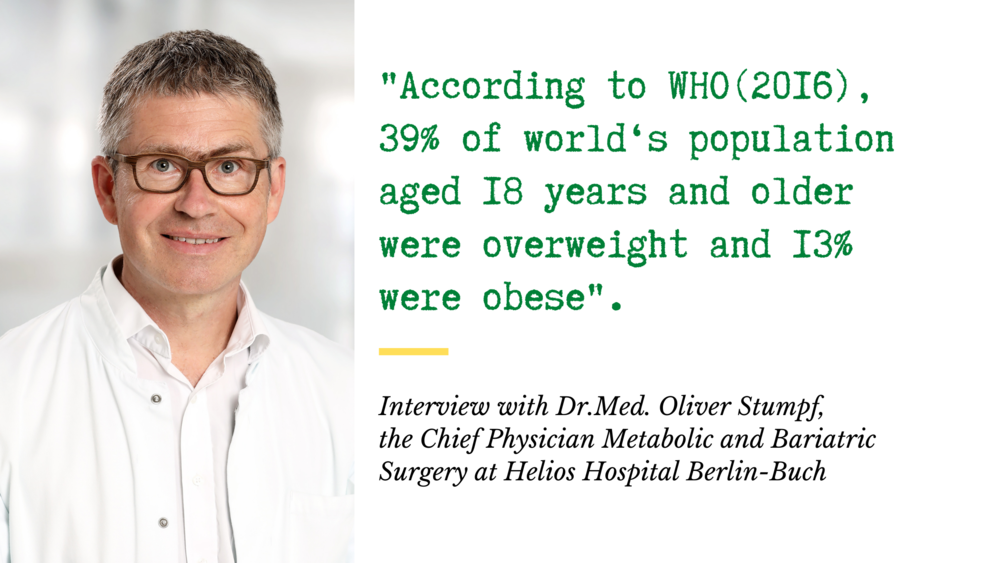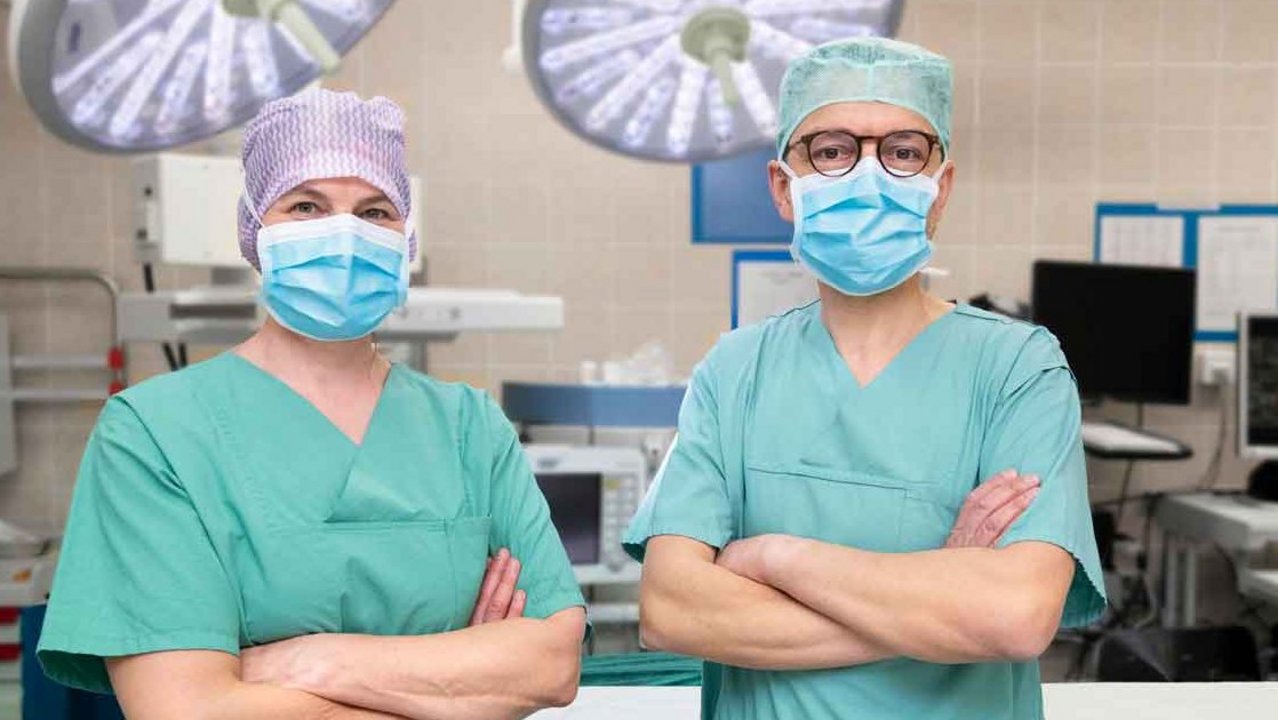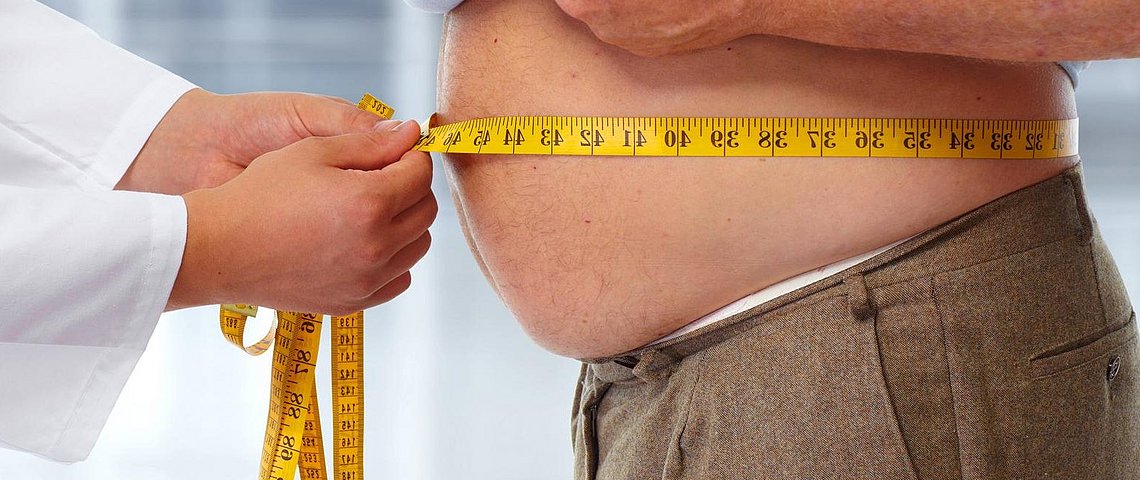
Interview: Bariatric surgery is not only about weight loss
Dr.med. Oliver Stumpf, the Chief Physician of Metabolic and Bariatric Surgery Department at Helios Berlin-Buch, tells about wide-spreading obesity problem and about bariatric surgery as the most effective solution.
I noticed that the fear of the pandemic influenced the buying habits. If you would recall, there were people trying to hectically buy food in large amount and it was not fresh products, but mostly ready meals. Therefore, I guess the pandemic could trigger some eating disorders.
The problem becomes more pressing over the course of time. According to WHO, in 2016, 39% of world‘s population aged 18 years and older were overweight and 13% were obese. Since 1970-s the numbers have tripled. In addition, we observe an increase not only in the number of overweight people, but also in the average weight of obese people.
The obesity problem is influenced by many factors. As we know, throughout the human history we were scarce of food, so those who found it had an evolutionary advantage. Everything changed 100 years ago - we do not have a lack of calories anymore. In fact, high-calorie food became cheaper, than a quality food with fewer calories. People exercise less. Today nobody walks 12 km per day as it was 150 years ago; machines take over work with high physical activity. There are also psychological factors that cause obesity, because food and emotions are closely related to each other.
The only thing that has not changed is genetics, that is when there are genetic causes of obesity, but this is more about an exception from the rule.
I often deal with eating mistakes rather than with true eating disorder, which is less common. A diagnosed eating disorder requires psychological help, namely a psychotherapy.
"Concurrent diseases are a motivation to go for bariatric surgery"
WHO acknowledged obesity as a disease and divides it into categories, which are defined by the Body Mass Index. Class 1 is BMI of 30 to 35, class 2 - BMI of 35 to 40, class 3 - BMI 40 or higher. The higher the BMI, the higher are the health risks. Mortality rate of patients with a BMI of 40 and higher is 9 times higher than of patients with a normal weight.
Obesity might undermine cardiovascular system. Possible problems range from high blood pressure and blood vessels changes to heart attacks and strokes. Type 2 diabetes mellitus, which is often associated with the overweight, can cause such concurrent diseases associated with nerve, kidneys and even retina damage.
The human skeleton does not have to withstand this kind of stress. Imagine that a person with the weight of 140 – 170 kg (taking into account that a normal weight is about 80 kg) had to carry a 60 – 80 kg backpack.
Ovarian cyst is the most popular infertility cause of overweight women. Obesity very often leads to fatty liver, which might cause inflammation and then liver cirrhosis. Even some types of cancer might be caused by obesity.
It is crucial to point out, that bariatric surgery is not only about losing weight. The patients feel healthier afterwards and concurrent diseases are often a motivation to go for surgery. The chances of recovery after the surgery are very high.
70-80% of patients with type 2 diabetes mellitus do not need to take medicine anymore. High blood pressure might stabilize completely or it can significantly decrease in 60% of cases. We often manage to reduce the stress on joints, e.g. knee joint, heal them up and cure ovarian cysts. Fatty hepatosis and liver inflammation can also be completely healed with help of surgery.
“A desired result without a surgery is rather an exception”
We treat a wide range of diseases, therefore, if it is necessary, we can consult with other specialists, for example, if we want to clarify or improve a situation regarding concurrent diseases. We also use extremely effective scientifically proven methods.
Modern conservative treatment is a multimodal therapy based on three pillars: healthy diet, behavioral changes (because nutrition and behavior are connected) and physical activity. A patient and doctors work in all these areas at the same time for 6 months. If within this time period we don’t manage to reduce weight and a BMI is still too high, we recommend a surgery.
However, there is an exception: if a BMI is over 50, it’s impossible to reach a BMI below 40 without a surgery.
There are such programs, indeed, that include a low-calories diet and an intense physical therapy. However, there is a problem: can a severe obese patient exercise at all? For a person who can barely sit on a bed, physical activity would be to stand up and walk for a bit. Therefore, these programs are not suitable for everyone. We make a physical therapy plan for each patient individually. There are a lot of patients with severe obesity, so that they can’t go further without a surgery.
There were researchers in Sweden who had been conducting an 18-year long comparative study of 2000 patients after surgery with 2000 patients without surgery. The results showed that the patients without surgical treatment lost only 1% of their weight over the researched period. The patients, who went through surgery, lost significantly more kilograms. Therefore, if a patient manages to achieve a certain result without surgery, it’s rather an exception.
“Each surgery has its own advantages”
The most frequent surgeries are a gastric bypass and sleeve gastrectomy, which is now the most popular bariatric surgery worldwide. For example, during the sleeve gastrectomy surgery a surgeon converts a stomach into a tube and removes a part of it. This restraining method helps to reduce hunger significantly. The advantage is that we preserve the natural path of the gastrointestinal tract. However, we recommend to our patients to take special supplements after the surgery and go through a post-surgical therapy.
We also offer Roux-en-Y gastric bypass, which is the most well-known and the most researched method that guarantees solid long-term results. We also use Omega Loop-Bypass.
Both procedures, i. e. Roux-en-Y gastric bypass and Omega Loop bypass, have not only a strong restrictive (limiting) mechanism, but also a metabolic one. This means that they influence the metabolism, for example, by improving the condition of a diabetic patient even before they lose weight and the effect becomes noticeable as early as on the 1-st or 2-nd day. The techniques I mentioned also change the intestine absorption of nutrients, not significantly. Surgery with a strong malabsorption syndrome is a biliopancreatic diversion, which is a bypass that works due to the malabsorption itself. However, there's a risk of getting deficiency disease, so we are very careful with this procedure.
Each surgery benefits the patient in its own way. We usually recommend first a gastric bypass, because the percentage of revisions is quite low. However if a patient had multiple gastrointestinal surgeries, we recommend sleeve gastrectomy. It helps 7 out of 10 patients, but 30% of patients have a risk of gaining weight afterwards. Then we might have to perform another surgery: not a sleeve gastrectomy but, for example, a bypass surgery. If there are no contraindications, we always take into account wishes and expectations of the patient. At the end of the day, we want the patients to identify themselves with the upcoming surgery.
"I used to go to the mall and everyone would stare at me from afar. Now, no one looks at me like that anymore. And suddenly I realized - I'm just like everyone else"
The average age of my patients is about 40. However, we have some very young patients in the department who have severe concurrent diseases such as diabetes or high blood pressure. There are also patients over age 65. In their cases, we strive to make sure that they remain independent and do not need care in the future.
First, we assess the risks. What is the patient's condition? Do they have any concurrent diseases? Is there anything we can do to make it easier for the patient to tolerate the surgery? When the patient arrives, we need about 2-3 days to prepare him for surgery. We perform a surgery, and the same day we give the patient 500 ml of water. We increase the amount of liquid and gradually begin to give more solid food. On the first day it is yogurt, then mashed potatoes and soups. We recommend international patients to stay in the hospital for about a week after surgery to recover completely. If everything is fine, the patient can go home. Then the patient enters into a phase, when the weight is reduced on its own, and the patient must stick to our dietary recommendations and little by little start exercising more every day. There is a longer phase of weight loss. Usually we achieve a good result after one year, and after a year and a half, the patient reaches a long-lasting remission. If necessary, the patient undergoes plastic surgery to remove the skin folds. We discuss with patients from other countries in advance, when they should be examined after treatment. The patient can always consult with us and send us the results of examinations.
Luckily, complications after bariatric surgery are rare. Last year severe complication rate was 2.3%, it is very low. There is a possibility of leakage at the junction of new tissues, which shows up in less than 1% of cases. A bleeding rate at out hospital is about 1%.
To be honest, recurrences always happen because the concept was not fully implemented or the patient violated our recommendations. For example, they start to consume large amounts of sugar after bypass surgery, which leads to so-called dumping syndrome. If the patient doesn’t consume the recommended amount of food, the "tube" that we formed during the sleeve gastrectomy can stretch.
For me, nothing is more inspiring that seeing how the patients discover absolutely new feelings and new possibilities in their lives - for example, when someone starts exercise more not just because the doctor told so, but because they suddenly start loving it. Some patients might become even an avid runner. I had patients who never went outside before treatment, but suddenly they discover geocaching and start walking in the woods and looking for some hiding spots. It makes me very happy when women are enthusiastic about how they can choose beautiful clothes again. Once one patient told me, "I used to go to the mall and everyone would stare at me from afar. Now, no one looks at me like that anymore. And suddenly I realized - I'm just like everyone else". I have witnessed these changes many times: a passive person in the past suddenly becomes a person with high vital and vibrant energy.
Related stories:
Do you need more information about Helios Hospitals or want to schedule your treatment?






